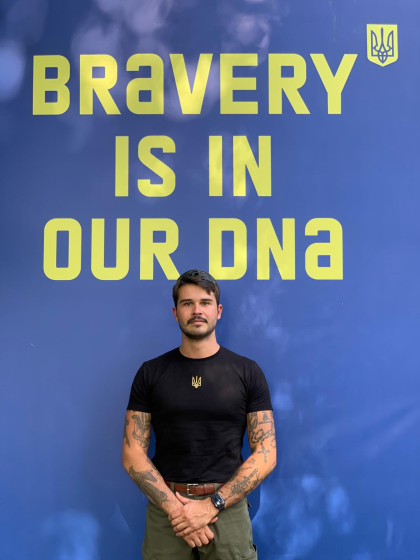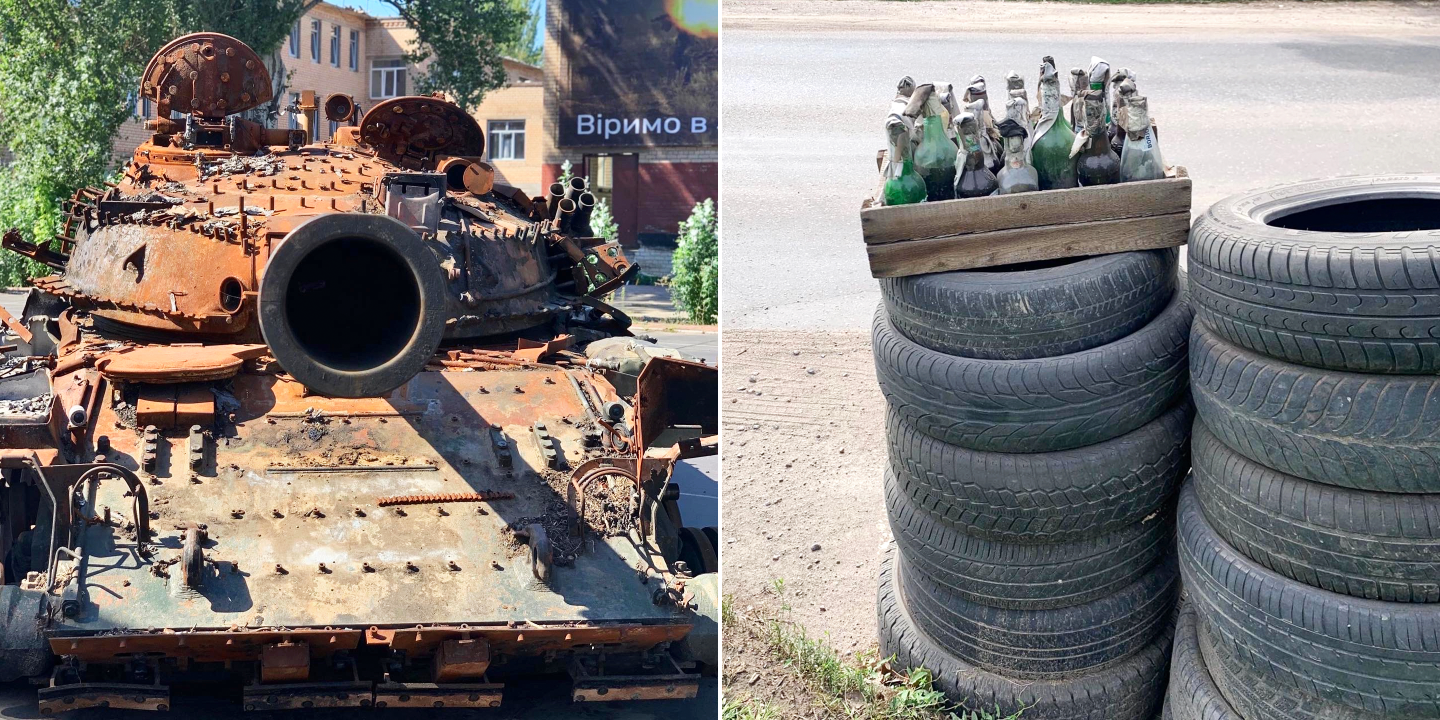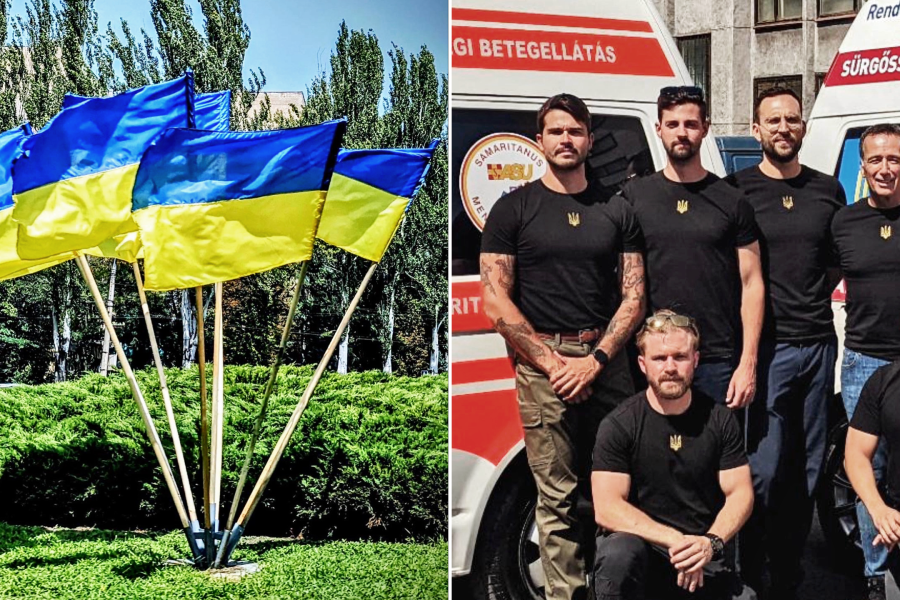In many ways, Nick was like any other typical 13-year-old, jabbering away about his favorite television shows and his pastimes, and proudly declaring his dad to be his hero. But the more Nick talked, the clearer it became that he was not a kid living under normal circumstances. He spoke about the nightly air raid sirens that sound in his Ukrainian neighborhood, recalled having to relocate to a bomb shelter temporarily, and described how to use a Molotov cocktail. At just 13, Nick was already a survivor of war. And yet despite all he had experienced—or perhaps because of it—the teen was still determined to do his part for his community.
At least, that's how it appeared to Johns Hopkins graduate student Jonathan Klein, who met Nick and his mother, Mary, during a transformational trip he took to Ukraine this summer as part of Project Independence Day. The fundraising mission, which aimed to purchase and personally deliver three ambulances to the central Ukrainian city Kryvyi Rih, relied on locals like Nick (whose name has been changed to protect his identity and safety) and his mother to help coordinate the team's passage through the active warzone. Facing backward from the front seat of his mother's car, Nick chatted animatedly about his life on the war's frontlines, and Klein soon realized that the boy had the perspectives and insights of a much older person.

Image caption: Jonathan Klein poses in front of a Bravery to Be Ukraine campaign sign
Image credit: Courtesy of Jonathan Klein
"He had a very deep understanding of the realities of war and the things that people are capable of doing to one another. And that really broke my heart. That's something that a human being should never see," Klein says. "He had a lot of hope—he believes in the Ukrainian people, and he is appreciative of the international community's support of Ukraine. But at the same time, he's worrying about the safety of his family on the frontlines. If he can be optimistic and kind under those circumstances, it speaks volumes of the character of that young man."
Ukraine has been bombarded by military forces and artillery since late February when Russian President Vladimir Putin authorized missile strikes and mobilized troops across Ukraine's eastern border. Approximately 7 million refugees have fled Ukraine, and a third of the country's 41 million citizens is estimated to be currently displaced as a result of the military action. The nation's medical infrastructure in particular has suffered extensive damage during the war. According to a World Health Organization tracker, as of Sept. 1 there have been 495 attacks on health care facilities or ambulances in Ukraine since the Russian invasion began (though a July social media post by Ukraine's health ministry suggests closer to 900 facilities have been damaged or destroyed). As Ukrainian President Volodymyr Zelensky mounts a counteroffensive in the country's southern region to force a Russian retreat, there is much rebuilding required in the nation's interior.
Moved by the Ukrainian people's resilience and outraged by the reported attacks on health care facilities (a war crime under the Geneva Convention), Klein, an Army veteran who is midway through an online master's degree in global security studies, joined Project Independence Day after his friend and fellow veteran Brian Bui, now a student at Harvard Business School, approached him about the opportunity. He joined team members Sam Ashley, Sean O'Donnel, and project co-founders Alex Clark and Andrei Molchynsky, both of whom are graduate students at Stanford University. Together with the help of the Ukrainian Freedom Fund, British Ukrainian Aid, and the European Bank of Reconstruction, the team raised $120,000, mostly from small-dollar donors, to purchase three ambulances in Hungary and drive them to the steel-producing town of Kryvyi Rih, where Molchynsky has family.
The city, home to some 600,000 Ukrainians (including Ukraine's President Zelensky, who grew up there), was an early target for Putin's attacks. Although a Russian ground invasion into the city failed last month, Kryvyi Rih still bore some of the damage from those early missile strikes when Klein and his team members delivered their ambulances to the city. Although one of the three ambulances was damaged during their drive across the country, the other two were officially presented during a Ukrainian Independence Day ceremony on Aug. 24, where city officials recognized the team's effort with municipal awards. The third ambulance will join operations on the ground in Kryvyi Rih after its transmission is replaced.

Image caption: Evidence of the Russian invasion mars the Ukrainian countryside. A Russian tank (left) lay abandoned in Kryvyi Rih, while a box of Molotov cocktails (right) stand on the side of the road.
Image credit: Courtesy of Jonathan Klein
But that night, Kryvyi Rih was again the target of a Russian cluster munitions attack. These bombs, outlawed by signatories of the 2010 Oslo Convention—which does not include Russia—are designed to detonate midair and release hundreds of smaller explosives over a wider area. Cluster munitions are sometimes capable of leveling whole city blocks. The strike occurred just minutes from where the Project Independence Day team was headquartered.
"When you hear something like that, it's so devastating," Klein says. "You wonder, 'Did we even drive real change?' You just want to make sure that those people are safe. I was there for five days, but those people—people like Nick—they live there. My mind is with them."
As Klein returns to his normal life in Charlotte, North Carolina, he'll be working on a thesis on asymmetrical warfare, insurgencies and counterinsurgencies, and how smaller powers fight larger ones in war. He says it's no coincidence he ended up getting involved in the Ukraine resistance. But the mission was much more than merely an academic exercise for Klein, who has been involved in volunteerism his entire adult life. It was an opportunity for him to use his military background with the 101st Airborne Division of the U.S. Army and his fundraising savvy to do some good in the world.
But he says that it's not always necessary or practical to tackle global issues like war. Sometimes the biggest difference a person can make is in their own community, he says.
"It's not always necessary to make a grand gesture," he says. "Our mission wouldn't have been possible without the people who donated to the cause, or the people on the ground in Ukraine who took time out of their day to help us. I think a lot of people don't realize that donating $3, $5, giving an hour a month volunteering—it does snowball and it does effect change."
Posted in Student Life, Politics+Society








